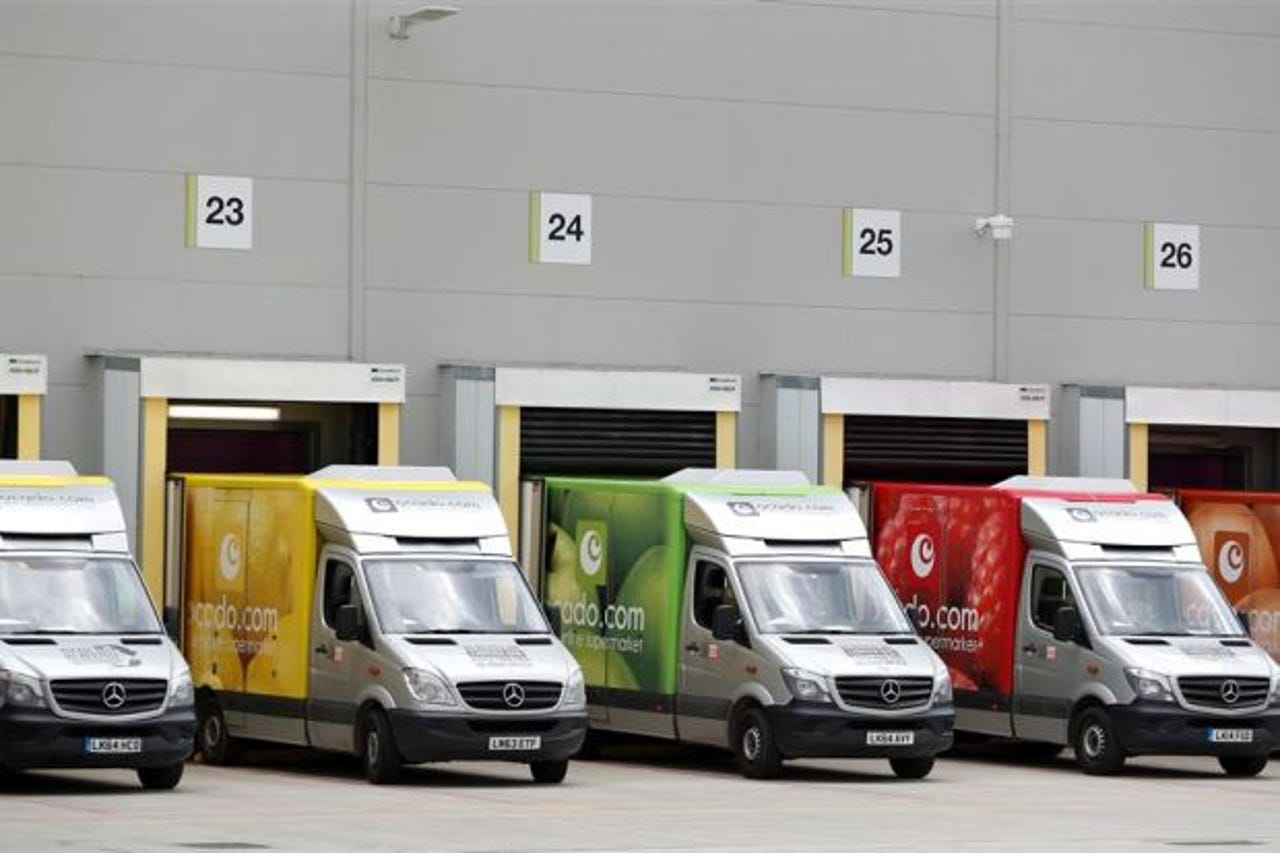This online grocery company wants its robots to deliver right into your kitchen


Ocado is investing £10 million in Oxford-based start-up Oxbotica, which develops autonomy software for vehicles.
Online retailer Ocado is exploring the possibility of having robots packing, transporting and delivering groceries all the way to customers' kitchens, with a new partnership designed to bring new levels of automation to the warehouse.
The British e-tailer is investing £10 million ($14 million) in Oxford-based start-up Oxbotica, which develops autonomy software for vehicles, with the objective of testing different ways of integrating the technology with Ocado's hardware. Ocado will take a seat on Oxobtica's board.
Robotics
Among the projects envisioned by the two firms are autonomous vehicles travelling inside Ocado's warehouses to move orders around the buildings and surrounding yard areas, but also driverless delivery vans and even "kerb-to-kitchen" robots to facilitate what is known as last-mile logistics – the final steps between a customer's doorstep and the vehicle carrying their order.
SEE: Building the bionic brain (free PDF) (TechRepublic)
Automating these processes could cut costs significantly. According to Ocado, logistics costs weigh heavily in the expense hierarchy of online grocery: the cost of final mile delivery alone represents 10% of sales, with labor constituting about half of the costs.
Ocado and Oxbotica had previously worked together in 2017, when the e-tailer conducted a two-week trial using an early prototype vehicle doing autonomous deliveries in London. Oxbotica has now further developed two core products that will be used by Ocado's team – a software suite that enables vehicle autonomy, as well as a cloud-based autonomy management system to monitor and control fleets.
A dedicated team of engineers within Ocado's Advanced Technology division will work with Oxbotica to come up with new use cases for the technology.
Ocado is keen to demonstrate that the nature of its business is not limited to online retail; rather, the company speaks of itself as a "technology company". Although the e-tailer's main activity still consists of providing online grocery services, mostly for UK retailer Marks & Spencer, Ocado is also heavily investing in robotics, AI, machine learning and edge intelligence.
This has led to the development of the Ocado Smart Platform (OSP), which includes end-to-end software systems to operate online retail businesses, from running an e-commerce website to managing the routing of delivery vans.
Perhaps the most well-known part of OSP is warehouse management, which Ocado developed in the form of huge hive-like buildings where groceries are stored in crates, over which dishwasher-sized robots coordinate to pick and mix goods for customer orders.
OSP is sold to retail businesses like Marks & Spencer, and the platform is the reason why Ocado describes itself as a technology provider. As a result, the company has focused primarily on improving OSP services; at the end of last year, for example, Ocado bought Kindred Systems, which designs AI-powered systems for warehouses, as well as robotic arm designer Haddington Dynamics.
The new partnership with Oxbotica is yet another signal from Ocado that it is willing to bring OSP's capabilities one step further.
"We are excited about the opportunity to work with Oxbotica to develop a wide range of autonomous solutions that truly have the potential to transform both our and our partners' customer fulfillment centers and service delivery operations, while also giving all end customers the widest range of options and flexibility," said Alex Harvey, chief of advanced technology at Ocado.
Due to the regulatory landscape, Ocado expects that the development of vehicles that operate in restricted areas such as inside fulfillment centers will become a reality sooner than fully autonomous deliveries to consumers' homes. The first prototypes of some early use cases are expected to be ready within two years.
With a workforce now approaching 19,000 employees, Ocado maintained that the vehicle autonomy program will not have any impact on the company's current hiring or employment levels within logistics and operations groups.
SEE: What is Agile software development? Everything you need to know about delivering better code, faster
Ocado will now have to prove that the company's extensive investments in new technologies are reflected in profit margins. Now more than two decades in the making, the e-tailer is yet to report significant profits. The past year, marked by a rise in online sales that came as a result of the global health crisis, seems to have benefitted Ocado, which saw revenues increase by about a third to hit £2.3 billion ($3.2 billion); but the jump was largely driven by retail revenue, with earnings from technology services yet to match the company's more traditional offerings.
Ocado is also competing in a fast-evolving market, with autonomous delivery systems projected to grow at over 24% to more than $84 billion globally in 2031. Giant e-tailers like Amazon are aggressively expanding their capabilities, and have last-mile delivery robots already operating in some cities; and small start-ups are also popping up to automate delivery processes.
Even more traditional companies like Ford are getting involved in the space: the automaker recently announced that it was purchasing a two-legged, two-armed robot produced by Agility Robotics, to carry parcels from delivery vehicles straight up to customers' doors.